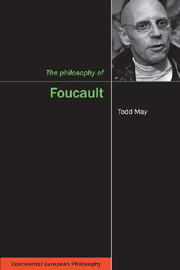Book contents
- Frontmatter
- Contents
- Abbreviations
- Acknowledgements
- 1 Introduction: who are we?
- 2 Archaeological histories of who we are
- 3 Genealogical histories of who we are
- 4 Who we are and who we might be
- 5 Coda: Foucault's own straying afield
- 6 Are we still who Foucault says we are?
- Notes
- Further reading
- References
- Index
2 - Archaeological histories of who we are
- Frontmatter
- Contents
- Abbreviations
- Acknowledgements
- 1 Introduction: who are we?
- 2 Archaeological histories of who we are
- 3 Genealogical histories of who we are
- 4 Who we are and who we might be
- 5 Coda: Foucault's own straying afield
- 6 Are we still who Foucault says we are?
- Notes
- Further reading
- References
- Index
Summary
How might we embark on a historical approach, or a set of historical approaches, to address the question of who we are? Because of the complexity of our historical inheritance there are many avenues of entry. No single one among of them is preferred or exhaustive. There is no Archimedean point. Foucault himself, at different times in his life, offers different interpretations of his own approach. Usually, those interpretations depend on what is motivating him at the time; he tends to see his previous writings in light of current interests. There is, however, a traditional classification of his published writings into three periods: archaeology, genealogy and ethics. The first period encompasses the time from his first major publication, Histoire de la folie à l'âge classique (partially translated into English as Madness and Civilization) through his last methodological work on archaeology, The Archaeology of Knowledge. The other major works of that period are The Birth of the Clinic and The Order of Things. The second period is characterized by two major works, Discipline and Punish and the first volume of The History of Sexuality. The final period encompasses his last two published volumes of the history of sexuality, The Use of Pleasure and The Care of the Self. If we are to give dates to these periods, we might say that the archaeological period runs from 1961 until 1968 or 1969, the genealogical period until 1978 or so, and the ethical period until his death in 1984.
- Type
- Chapter
- Information
- The Philosophy of Foucault , pp. 24 - 60Publisher: Acumen PublishingPrint publication year: 2006



